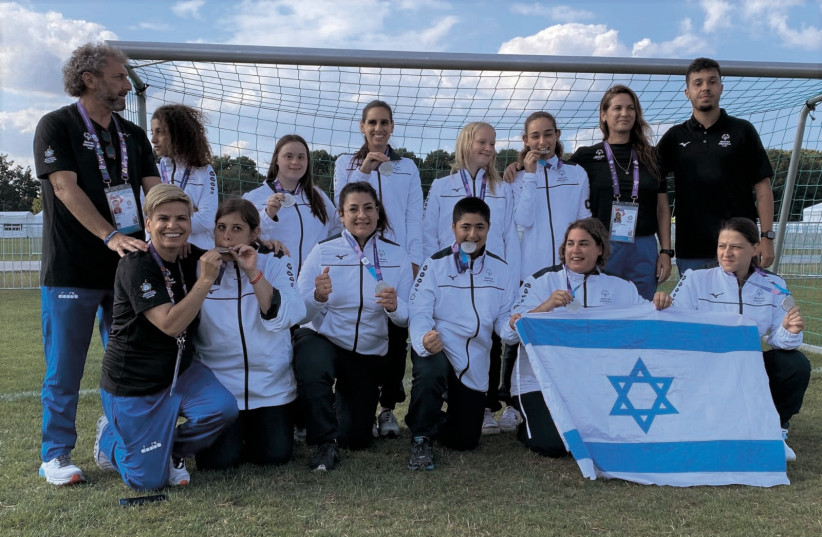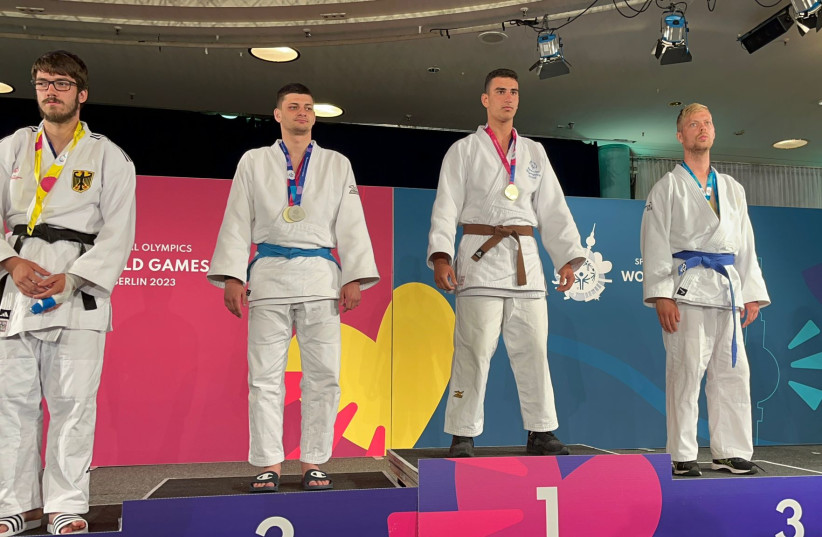There was thrilling success for the Israeli delegation at the Special Olympics World Games in Berlin, as Ron Bek was crowned world champion in athletics, and the national women's soccer team earned a silver medal.
Competing in eight different sports at the highest and most challenging competitive levels, the Israelis achieved an astounding nine gold medals at the highest ranks in events such as judo, athletics, swimming, and table tennis.
"As promised, we have returned home with a plethora of medals,” said Sharon Levy-Blanga, CEO of Special Olympic Israel. “Victories in competitions and podium finishes in the highest-ranking categories."
The Special Olympics World Games in Berlin came to a close on Monday, before the delegation returns to Israel with a total of 25 medals: nine golds, eight silver and eight bronzes.
The events and athletes that earned medals
In soccer, the Israeli national women's team, coached by the Israeli goal-scoring queen Silvi Jean along with the collaboration of the Attna Center for the Advancement of Women's Sports in Israel and the Israel Football Association, secured second place and won the silver medal.

In athletics, Ron Bek became the world champion by winning the gold medal in the 3,000 meters and the silver medal in the 5,000 meters at the highest competitive levels. Saar Buchbinder won gold in the 5-kilometer and 10-kilometer races, and Adi Mimoun reached third place in the 100-meter sprint and won a bronze medal in the relay race.
In judo, Ido Rabinovich achieved gold medals in the A category, the highest level, while Levav Barkan secured first place and a gold medal in the C category.
In swimming, Sappir Bar Yoel took first place in the 50-meter freestyle, Mir Segal won the gold medal in the 100-meter freestyle, and Aran Bar Feld earned a silver medal in the 800-meter freestyle.
In Unified Level 6 tennis, the highest level, Sonia Yanushok and her Unified partner Lior Ravach won the silver medal. Sonia Yanushok claimed the gold medal after defeating an Indian player and then a Spanish player. In table tennis, David Kristani achieved first place and won the gold medal.
In cycling, Noga Korn secured third place in the 5-kilometer event and earned a bronze medal. Additionally, in the 4-kilometer event, she achieved second place and won the silver medal.
“These are phenomenal achievements for our athletes,” added Levy-Blanga..“For months, our athletes have been training tirelessly, aiming to return with a plethora of medals and represent our country with honor at the Olympics in Berlin. In light of this, I invite the public, the media, and supporters from all over the country to join us tomorrow at Ben Gurion Airport to welcome the delegation of athletes. Only by doing so can we truly embrace the spirit of inclusion and recognition of the immense potential within each individual. Together, we can create a world that genuinely values diversity and upholds the principles of equality."
The Special Olympics World Games, one of the biggest sporting events in the world, began on June 17 in Berlin, marking the first time the event took place in Germany. Approximately 7,000 athletes from 170 countries around the world, with cognitive disabilities such as Down syndrome, autism, intellectual disabilities, and developmental disabilities, competed in 26 sports disciplines. Additionally, about 20,000 volunteers, 3,000 coaches, and around 300,000 spectators were part of this unique sports event.

Israel was represented in the International Games by a team consisting of 35 athletes, coaches, and guides. The Israeli athletes competed in eight sports: athletics, judo, tennis, swimming, cycling, table tennis, football, and bowling.
Among the athletes representing the country in the International Games, the women's football team holds a special place. Coached by Silvi Jean, the team comprises 14 players ranging in ages from 17 to 40.
Until now, the Israeli Special Olympics delegations going to the International Games have not received official support and recognition from the State of Israel for nearly 30 years. However, this year, for the first time, Minister of Culture and Sports Miki Zohar made a decision for the country to recognize Special Olympics Israel as a national organization, acknowledging the athletes' achievements and supporting the organization leading up to the International Games. This is a historic decision that reflects the progress of individuals with intellectual disabilities in the country, a population deserving of visibility and equal recognition, with their accomplishments and potential to benefit the entirety of Israeli society.
The participation of Special Olympics Israel in the World Games was made possible through the collaboration of various organizations in Israel. These include the Ministry of Culture and Sports, sponsors such as Teva Israel, which sponsored the production of a video for the mass recruitment campaign leading up to Berlin, local authorities that provided financial support to the athletes from their respective cities traveling to Berlin, and passionate individuals who believe in the value of equal opportunities for everyone. This significant event reflects the growing recognition and support from Israeli authorities, strengthening their commitment to foster inclusion and empower individuals with intellectual disabilities.
The position and history of the Special Olympics
Special Olympics is one of the three Olympic organizations recognized by the International Olympic Committee (IOC) alongside the Olympics and the Paralympic Games. Special Olympics is the professional committee that provides training, courses, and professional ethics alongside accessible competitions, both in Israel and abroad, for children and adults with intellectual, developmental, and communication disabilities throughout the year, in various Olympic sports.
Special Olympics is a global movement founded in 1968 by Eunice Kennedy Shriver with the goal of ending the discrimination against people with intellectual disabilities. It promotes the inclusion of all individuals through sports and various programs in the fields of education, health, and leadership. Over six million Special Olympics athletes are active in more than 192 countries. The movement organizes over 100,000 games and competitions each year in over 30 Olympic sports.
